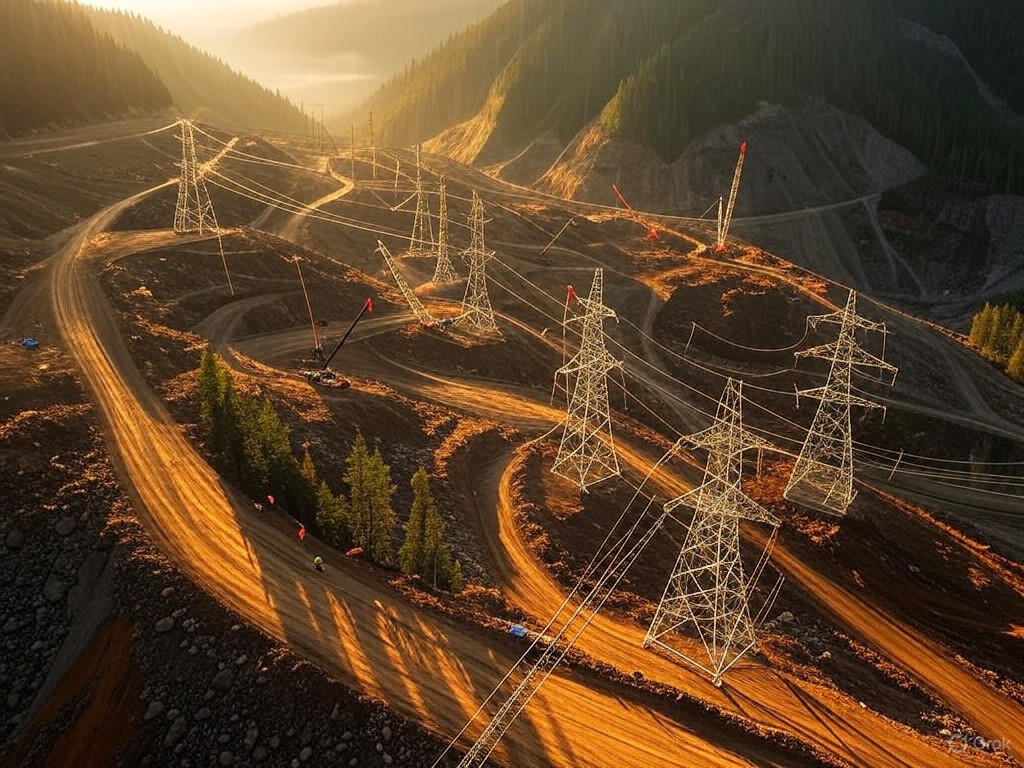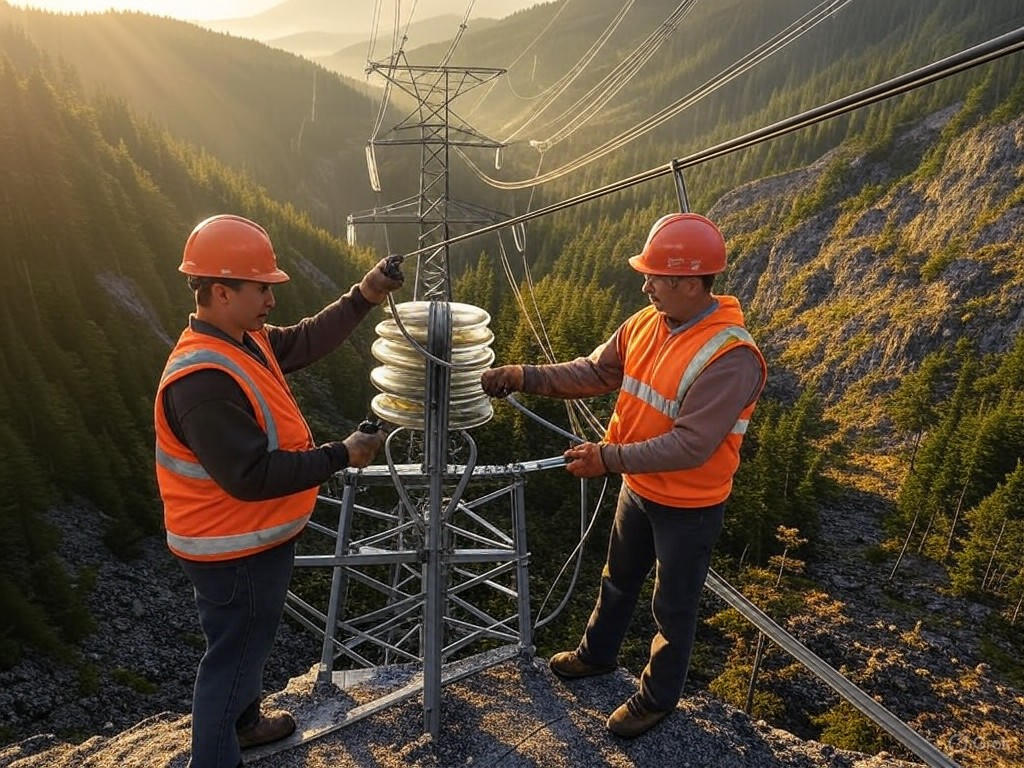BC’s Power Line to Terrace: Fueling Global Mineral Demand
In an era where the world’s appetite for technological marvels outpaces the steady hand of progress, one might liken British Columbia’s ambitious 500 kV power line to Terrace to a well-mannered suitor—promising, persistent, yet beleaguered by the inevitable complications of courtship. As a keen observer of societal machinations, I, Joanna Aucton, find it fitting to examine this infrastructure endeavor not merely as a feat of engineering, but as a testament to the enduring spirit of free-market ingenuity in the face of budgetary prudence and traditional community concerns. This project, threading through the rugged landscapes of Canada’s western frontier, stands as a linchpin in meeting global demands for critical minerals, even as it navigates the rocky terrain of fiscal constraints and local stakeholder dynamics. Yet, in true center-right fashion, we must advocate for its advancement through sensible, market-driven solutions rather than unchecked governmental expansion.
The Backbone of Economic Vitality: Why the Power Line Matters
At its core, the 500 kV power line to Terrace represents a vital artery in British Columbia’s economic framework, channeling the lifeblood of reliable energy to fuel the extraction and processing of critical minerals—those indispensable elements like copper, lithium, and rare earth metals that underpin everything from smartphones to electric vehicles. Terrace, nestled in the northern reaches of BC, has emerged as a key hub for such operations, where vast mineral deposits await the steady hum of industrial activity. This infrastructure project, estimated to cost upwards of $1.5 billion, promises to bolster the region’s capacity to supply the global market, particularly as demand surges amid the tech boom and green energy transitions.
One cannot overstate the free-market implications here. In a world increasingly reliant on these minerals for innovation, BC’s power line could position Canada as a premier supplier, fostering job creation and export revenues without the heavy hand of excessive subsidies. According to a detailed analysis by the Wall Street Journal, the global critical minerals market is projected to grow by 10% annually through 2030, driven by private sector investments rather than government mandates. This aligns with traditional values of self-reliance and economic liberty, where private enterprises, not bureaucratic decrees, lead the charge in resource development.
Yet, for all its potential, the project is not without its hurdles. Budgetary challenges loom large, with inflation and supply chain disruptions inflating costs and straining provincial coffers. Advocates of limited government intervention would do well to note that unchecked spending could burden taxpayers, echoing the fiscal follies of overreaching public works that history has so often critiqued. Instead, a measured approach—leveraging public-private partnerships—could ensure the project’s viability without expanding the state’s footprint.

This image captures the expansive reach of the 500 kV power line snaking through British Columbia's wilderness, symbolizing the bridge between remote resource wealth and global economic demands.
Navigating Challenges: First Nations Engagement and Fiscal Realities
Delving deeper into the analysis, one must address the project's encounters with First Nations communities, whose traditional lands intersect with the proposed route. These interactions, while essential for maintaining social harmony, underscore the delicate balance between progress and respect for established ways of life. In BC, where First Nations have long stewarded the land, consultations have delayed timelines, with some groups raising concerns over environmental impacts and cultural heritage. Such matters are not to be dismissed lightly; they reflect a broader imperative for equitable dialogue in resource development.
From a center-right vantage, however, we must temper enthusiasm for inclusivity with a pragmatic eye toward efficiency. Prolonged negotiations risk stalling projects that could otherwise invigorate the economy, much like a novel’s plotline bogged down by superfluous subplots. The key lies in fostering agreements through voluntary, market-oriented mechanisms—such as revenue-sharing models or community benefit agreements—rather than imposing top-down regulations that inflate costs and deter investment. As noted in a report from the Fraser Institute, regions with streamlined consultation processes see faster project approvals and higher economic returns, benefiting all parties involved.
Budgetary woes further complicate the narrative. With initial estimates ballooning due to rising material costs and labor shortages, the project’s financiers—primarily a mix of provincial funds and private investors—face a stern test of fiscal discipline. Proponents argue that the long-term gains, including enhanced energy security and export opportunities, justify the investment. Yet, as IEEE Spectrum highlights in its coverage of North American grid expansions, success hinges on cost controls and innovative financing, such as tax incentives for private stakeholders. This approach honors traditional values of thrift and enterprise, steering clear of the pitfalls of government overreach that could lead to wasteful expenditure.
In essence, the power line’s challenges are not insurmountable but require a steadfast commitment to free-market principles. By prioritizing efficiency and mutual consent, BC can transform potential obstacles into opportunities for collaborative growth.

This photograph depicts dedicated crews working on the 500 kV line near Terrace, illustrating the human endeavor behind bolstering Canada's critical mineral supply chain amidst budgetary and community challenges.
Evidence of Impact: Weaving Data into the Narrative
To substantiate this analysis, let us turn to the evidence at hand. The global demand for critical minerals is nothing short of voracious, with projections from the U.S. Geological Survey indicating that production must nearly double by 2030 to meet needs for renewable energy and advanced technologies. In BC, the Terrace region alone holds reserves capable of supplying a significant portion of this demand, but only if reliable power infrastructure is in place. The 500 kV line, once operational, could deliver up to 3,000 megawatts of capacity, powering mining operations that might otherwise falter due to energy deficits.
Economically, the stakes are high. A study by the Canadian Mining Association estimates that projects like this could generate over 10,000 jobs in BC and contribute billions to GDP, all while minimizing reliance on foreign suppliers from less stable regions. This not only strengthens Canada’s position in the global economy but also upholds traditional values of industry and self-sufficiency. Contrast this with the budgetary pitfalls: Recent overruns, as reported in provincial audits, have added 20% to initial costs, underscoring the need for rigorous oversight and private sector involvement to keep expenditures in check.
Through this lens, the power line emerges as a beacon of balanced progress, where economic imperatives intersect with practical governance.
A Call for Prudent Progress: Charting a Sensible Course Forward
In conclusion, British Columbia’s 500 kV power line to Terrace stands as a compelling narrative of opportunity amid adversity—a story where the demands of a mineral-hungry world meet the realities of fiscal restraint and community stewardship. By embracing free-market solutions, such as targeted incentives and streamlined processes, we can ensure that this project not only supports global critical mineral needs but also fosters local prosperity without succumbing to the excesses of governmental intervention. As I reflect on this endeavor, it calls to mind the enduring wisdom of moderation: Just as a well-composed novel finds harmony in its elements, so too must our policies blend innovation with tradition.
Let us, therefore, advocate for a path that honors economic liberty and responsible stewardship, securing a brighter future for Terrace and beyond. In doing so, we reaffirm the center-right ethos that true progress arises not from ideological fervor, but from the steady application of common sense and enterprise.

